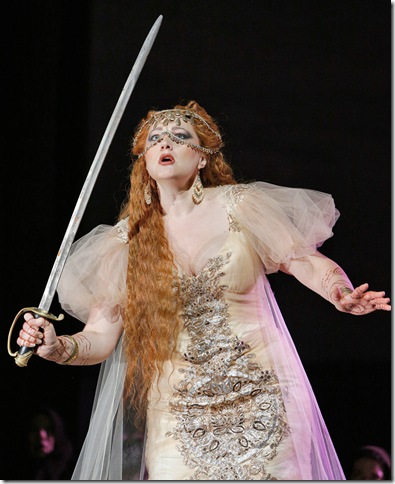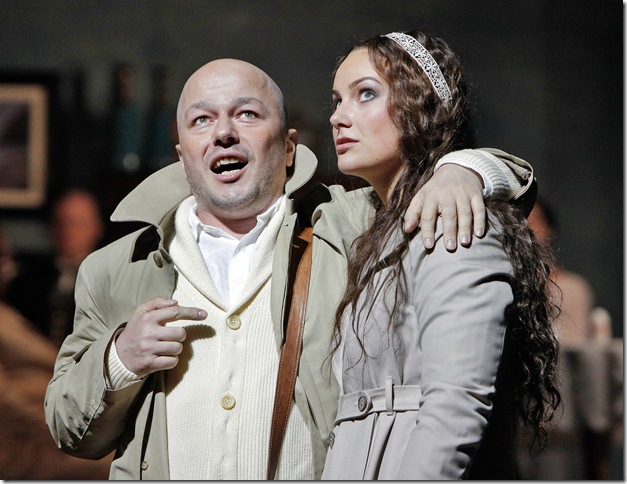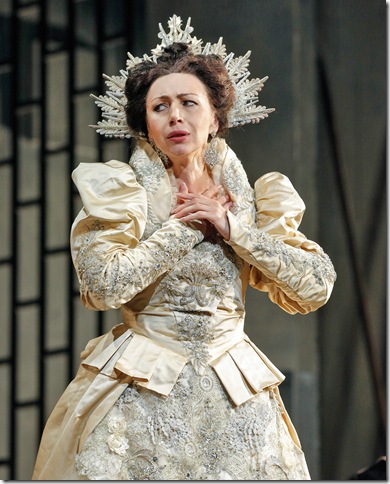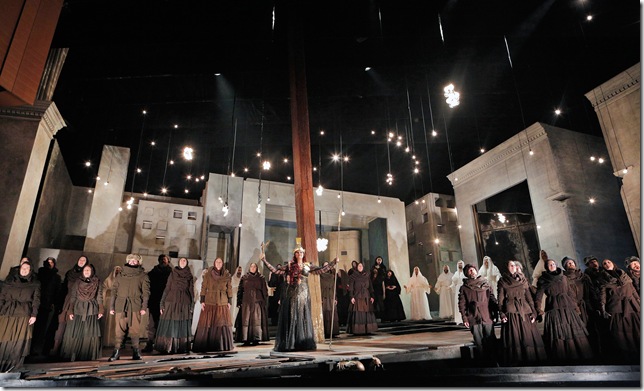Forget Kirov, forget Bolshoi: We may one day have our own Russian opera company in New York state.
Bard Summerscape, now in its 10th year delivered a magnificent performance of Sergey Taneyev’s Oresteia, premiered in 1895, which I saw on Aug. 4. The Annandale-on-Hudson festival is fast becoming a rival to Wagner’s Bayreuth as the place to be.
Production values are very high: Bard must be the envy of every opera impresario in America. Nothing is left to chance. Every detail in Thaddeus Strassberger’s direction makes for brilliance. This is indeed high art at its best.
Based on the Aeschylus trilogy, Oresteia is a well-condensed version of the Greek tragedy, except for parts of Act II, where duets between Orestes and Electra go on interminably as they plead for help from the Gods. Librettist A.A. Venkstern is much at fault here; it could be cut drastically. Lasting 3 hours and 40 minutes, the music is distinctly Russian and borrows, in orchestration, from Tchaikovsky, whose pupil Taneyev was at the Moscow Conservatory. Taneyev himself taught there later, where his students included Scriabin and Rachmaninov.
However, behind the melodies given to the singers, unlike Tchaikovsky, Taneyev challenges them with alternate bubbling tunes in the orchestration that make searching for pitch quite difficult. But the seven exceptional Russian singers imported for this production never failed to impress. The combined effect, voice versus orchestra, is electric, but never overwhelming.
The lead tenor singing Orestes was Mikhail Vekua, who was a standout, with a rich booming tenor and a ringing top, like Pavarotti. His middle range was equal to that of a young Domingo. It’s a big part, a demanding part, but Vekua’s energy level never sagged. He was thrilling to hear to the very end and very believable as Orestes. He fully deserved the uproarious standing ovation from the audience for his big sonorous voice.
King Agamemnon was sung by the Russian baritone Maxim Kuzmin-Karavaev. Another strong rolling rich voice that, though brief in appearance, certainly helped him make his mark as a fine singer and sensitive actor. Andrey Borisenko, baritone, sang two roles, that of lover to Queen Clytemnestra, Aegisthus, and Apollo Loxias, both of which he did with commanding presence and a grand deep voice.
Soprano Maria Litke also sang two roles: Cassandra, King Priam’s daughter, and Pallas Athena. As Cassandra, the captive princess, she won our sympathy with passionate gestures and some magnificent singing. Tall and statuesque, Litke reminded me of Galina Vishnevskaya. Her voice seems to be placed in the mezzo range but it is distinctly soprano with a rounded beautiful timbre. As the goddess Athena, her statuesque physique commanded the stage as she casts the deciding vote allowing Orestes to continue living, although he murdered his mother, Clytemnestra. This is a talent to watch; I could not takes my eyes off her.
Mezzo-soprano Liuba Sokolova, as Queen Clytemnestra, ranged the gamut of emotions on the way to her eventual decline and murder. Highly acclaimed in Europe for her acting ability and lovely voice, she impressed greatly in this difficult role. Olga Tolkmit as Electra, Oreste’s sister, gave a good account of herself with a strong soprano voice and a sweetness to match. These magnificent Russians were joined by Andrew Funk and Michael Riley who rounded out this wonderful cast.
And who do we have to thank for this? The founder of Bard Summerscape, Leon Botstein, who like Richard Wagner managed to engineer the building of a fine 800-seat opera house on the bucolic college campus, a house with good acoustics and a pit that holds the 70-member American Symphony Orchestra. It was designed by architect Frank Gehry. These rarely done operas, to my knowledge, are never rescheduled in American opera houses. Only Bard brings them to light, which is a pity. Easily topping $1 million in costs, this production matches anything done in Vienna or Berlin, money only European state subsidized opera companies can afford to risk.
Another astonishing contribution to this opera was the 56-member chorus. On stage much of the time, trained by James Bagwell, they sang the Russian text flawlessly and sounded far better than the aging wobblers one hears in the Met radio broadcasts. Kudos to all of them for sharp attacks, inspiring singing, fresh energy and a wholehearted participation that moved the story along seamlessly. Plaudits to Mr. Bagwell, in spades.
The contribution of the American Symphony Orchestra, ably conducted by Botstein, was magnificent. They played like demons and sounded beautiful at all times. What a treat to have an orchestra of this caliber in the pit.
The unusual set design on a raked stage was by Madeleine Boyd. It added much to the drama of the piece, with gaping holes the singers managed to avoid, as we sat on the edge of our seats waiting for someone to be swallowed up. Costumes by Mattie Ullrich ranged from sackcloth to magnificent.
One is left wondering how Bard will top this with next year’s choice of opera. As I have said, this 10-year-old festival could well explode into America’s Bayreuth, given the massive donations by generous opera-loving philanthropists that they attract.
Rex Hearn is founder of the Berkshire Opera and reviews the arts in Palm Beach and Berkshire counties.



